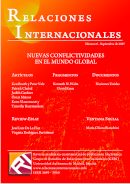State collapse and peace construction processes: the experience of the Somali women
Keywords:
women, traditional identities, reconstruction, activism, gender, Africa, SomaliaCopyright (c) 2007 Judith GARDNER

This work is licensed under a Creative Commons Attribution-NonCommercial-NoDerivatives 4.0 International License.
Abstract
The labeling of Somalia as a ‘failed state’ is uncontested among the international community. Nevertheless, different strategies have replaced the state as the backbone of society and thereby, Somali people have dynamized their society and economy (religious leadership, regional segregation as in the case of Somaliland and Puntland, etc). The still ongoing war, the serious threats to human rights and the dependence on external aid still call the attention of specialists. This article analyses the role of Somali women, the most affected population cohort in this type of conflicts: reinforcement and claiming of their traditional identities, pro-national reconciliation associationism, pacifist activism by means of cultural and religious action, demobilization of combatants, local reconstruction, etc. The Transitory Government, for its part, has not followed hitherto the UN Security Council Resolution 1325, and neither has it respected the agreements on the quotas of feminine parliamentary representation. Meanwhile numerous international actors keep simplistic and stereotyped views on the gender question in Somalia.





